中考英语二轮专题复习:祈使句与感叹句(知识详解+演练及答案)
文档属性
| 名称 | 中考英语二轮专题复习:祈使句与感叹句(知识详解+演练及答案) |
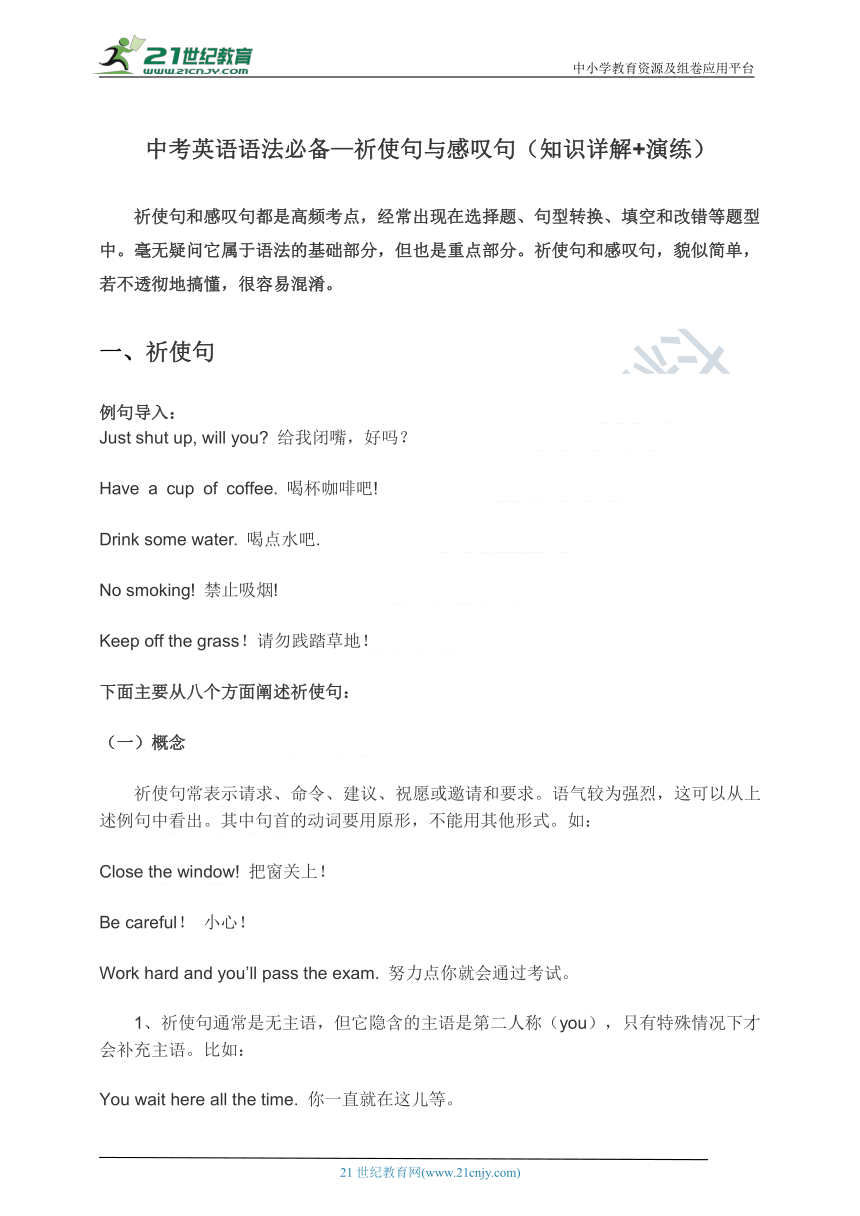
|
|
| 格式 | zip | ||
| 文件大小 | 1.2MB | ||
| 资源类型 | 教案 | ||
| 版本资源 | 通用版 | ||
| 科目 | 英语 | ||
| 更新时间 | 2019-08-02 00:00:00 | ||
图片预览

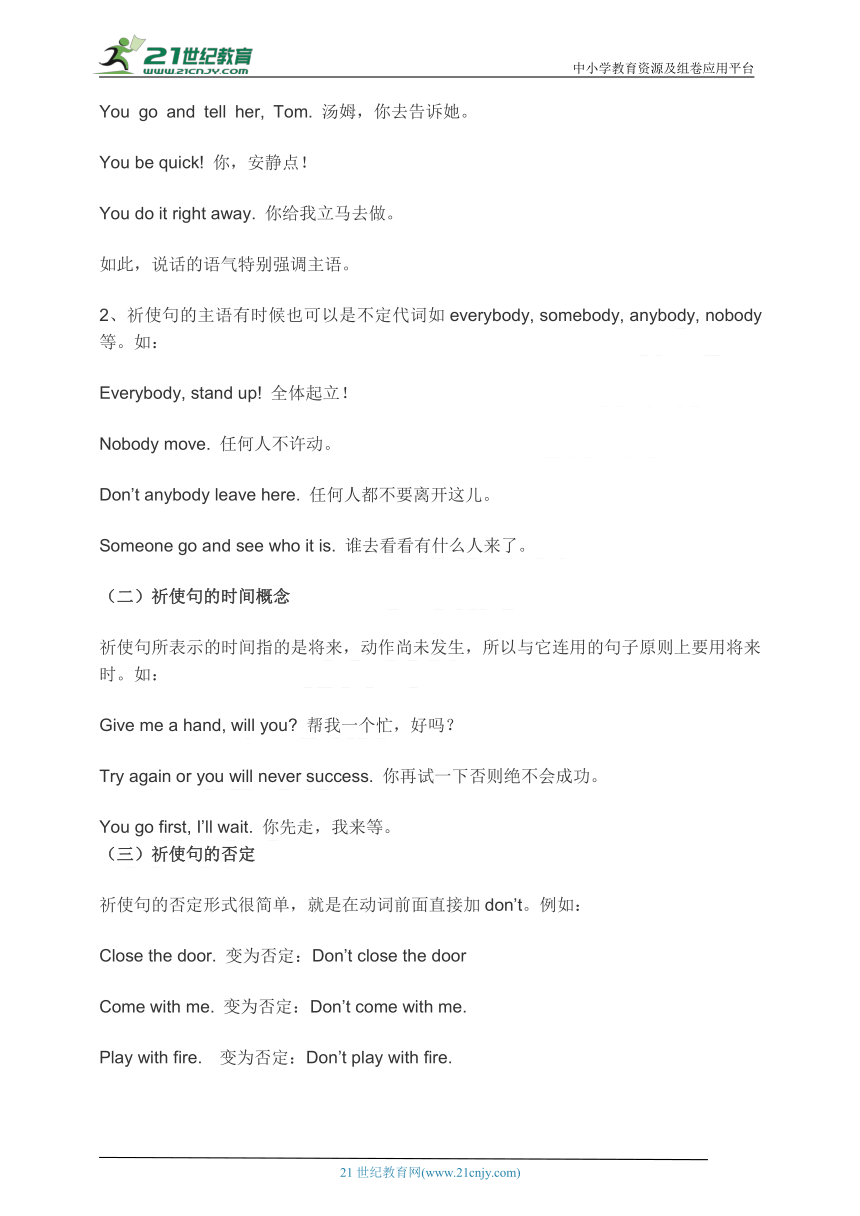
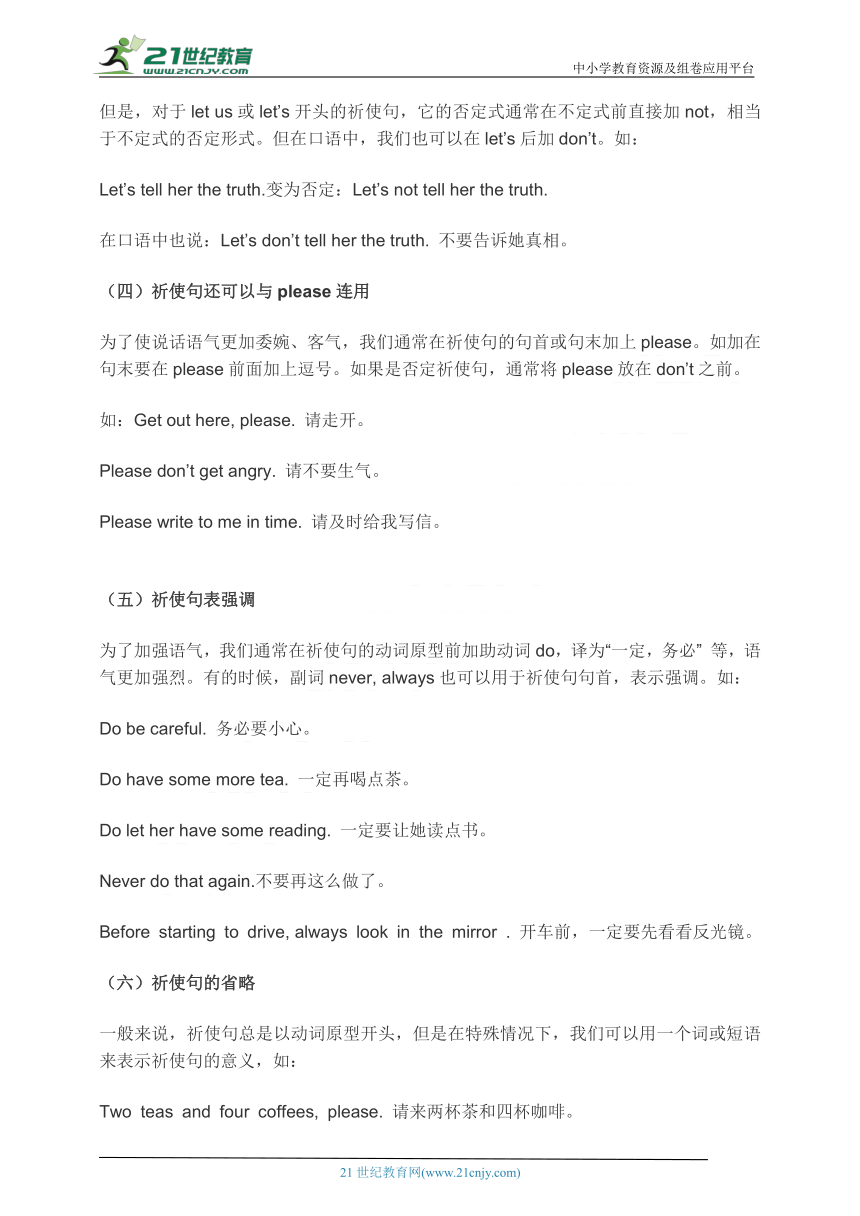
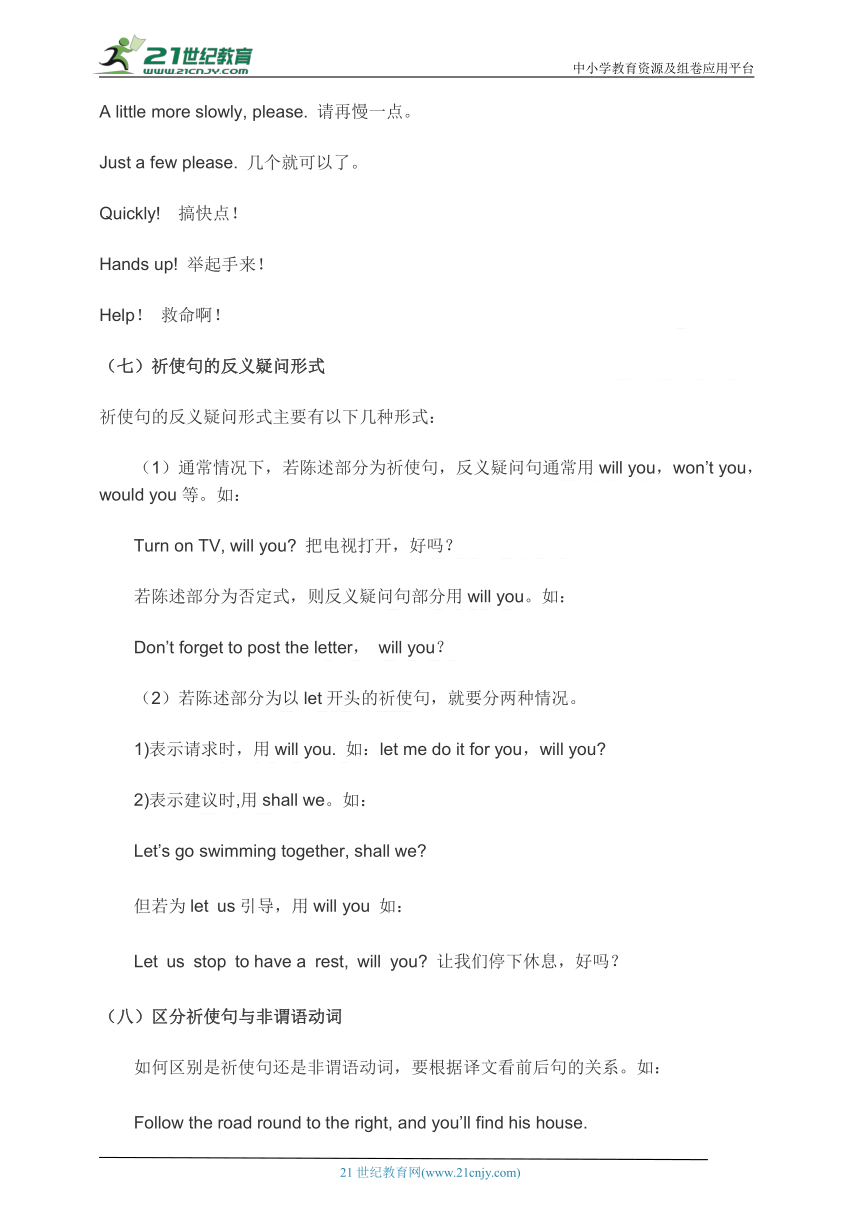
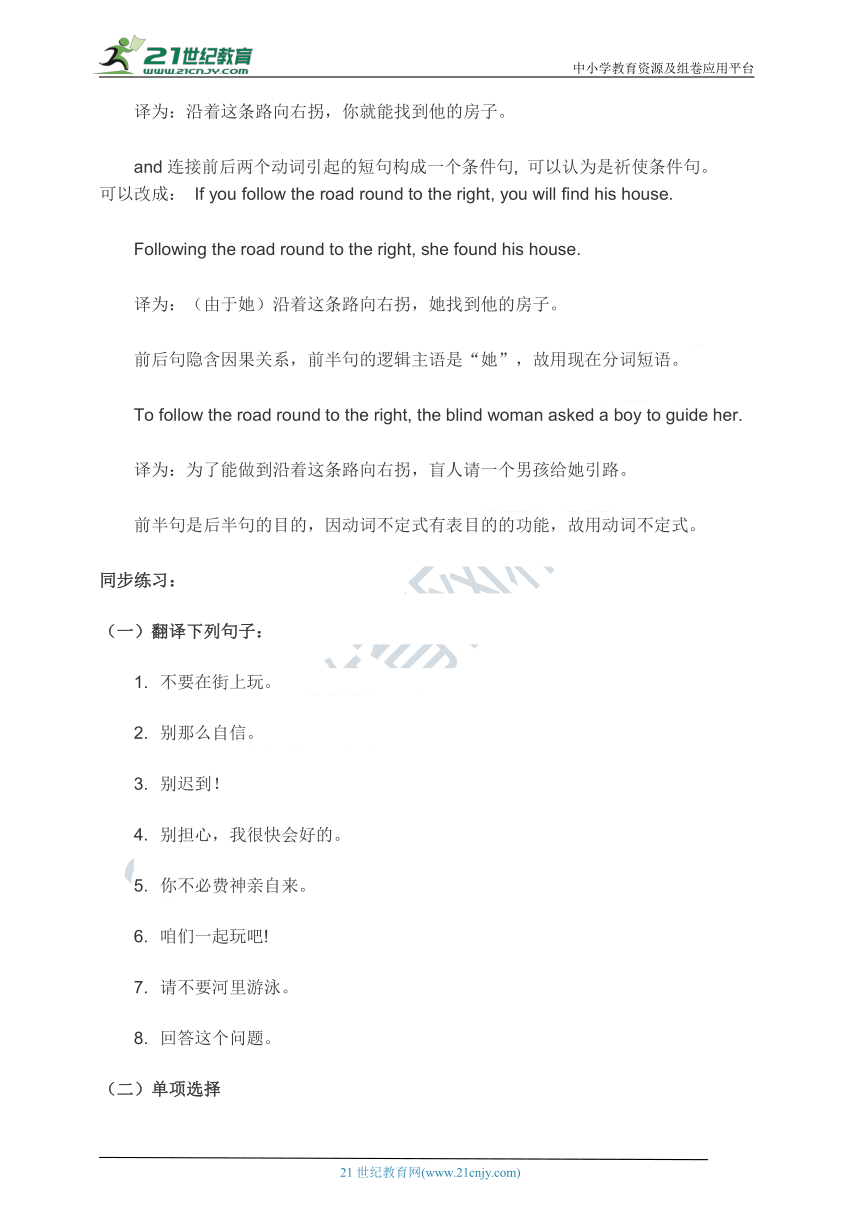
文档简介
中小学教育资源及组卷应用平台
中考英语语法必备—祈使句与感叹句(知识详解+演练)
祈使句和感叹句都是高频考点,经常出现在选择题、句型转换、填空和改错等题型中。毫无疑问它属于语法的基础部分,但也是重点部分。祈使句和感叹句,貌似简单,若不透彻地搞懂,很容易混淆。
一、祈使句
例句导入:
Just?shut?up, will?you? 给我 (?javascript:;?)闭嘴,好吗?
Have?a?cup?of?coffee.?喝杯咖啡吧!?
Drink some water.?喝点水吧.?
No smoking! 禁止吸烟!
Keep off the grass!请勿践踏草地!
下面主要从八个方面阐述祈使句:
(一)概念
祈使句常表示请求、命令、建议、祝愿或邀请和要求。语气较为强烈,这可以从上述例句中看出。其中句首的动词要用原形,不能用其他形式。如:
Close the window! 把窗关上!
Be careful! 小心!
Work hard and you’ll pass the exam. 努力点你就会通过考试。
1、祈使句通常是无主语,但它隐含的主语是第二人称(you),只有特殊情况下才会补充主语。比如:
You wait here all the time. 你一直就在这儿等。
You?go?and?tell?her,?Tom.?汤姆,你去告诉她。
You be quick! 你,安静点!
You do it right away. 你给我立马去做。
如此,说话的语气特别强调主语。
2、祈使句的主语有时候也可以是不定代词如everybody, somebody, anybody, nobody等。如:
Everybody, stand up! 全体起立!
Nobody move. 任何人不许动。
Don’t anybody leave here. 任何人都不要离开这儿。
Someone go and see who it is. 谁去看看有什么人来了。
(二)祈使句的时间概念
祈使句所表示的时间指的是将来,动作尚未发生,所以与它连用的句子原则上要用将来时。如:
Give me a hand, will you? 帮我一个忙,好吗?
Try again or you will never success. 你再试一下否则绝不会成功。
You go first, I’ll wait. 你先走,我来等。
(三)祈使句的否定
祈使句的否定形式很简单,就是在动词前面直接加don’t。例如:
Close the door. 变为否定:Don’t close the door
Come with me. 变为否定:Don’t come with me.
Play with fire. 变为否定:Don’t play with fire.
但是,对于let us或let’s开头的祈使句,它的否定式通常在不定式前直接加not,相当于不定式的否定形式。但在口语中,我们也可以在let’s后加don’t。如:
Let’s tell her the truth.变为否定:Let’s not tell her the truth.
在口语中也说:Let’s don’t tell her the truth. 不要告诉她真相。
(四)祈使句还可以与please连用
为了使说话语气更加委婉、客气,我们通常在祈使句的句首或句末加上please。如加在句末要在please前面加上逗号。如果是否定祈使句,通常将please放在don’t之前。
如:Get out here, please. 请走开。
Please don’t get angry. 请不要生气。
Please write to me in time. 请及时给我写信。
(五)祈使句表强调
为了加强语气,我们通常在祈使句的动词原型前加助动词do,译为“一定,务必” 等,语气更加强烈。有的时候,副词never, always也可以用于祈使句句首,表示强调。如:
Do be careful. 务必要小心。
Do have some more tea. 一定再喝点茶。
Do let her have some reading. 一定要让她读点书。
Never do that again.不要再这么做了。
Before?starting?to?drive, always?look?in?the?mirror?.?开车前,一定要先看看反光镜。
(六)祈使句的省略
一般来说,祈使句总是以动词原型开头,但是在特殊情况下,我们可以用一个词或短语来表示祈使句的意义,如:
Two?teas?and?four?coffees,?please.?请来两杯茶和四杯咖啡。
A little more slowly, please. 请再慢一点。
Just a few please. 几个就可以了。
Quickly! 搞快点!
Hands up! 举起手来!
Help! 救命啊!
(七)祈使句的反义疑问形式
祈使句的反义疑问形式主要有以下几种形式:
(1)通常情况下,若陈述部分为祈使句,反义疑问句通常用will you,won’t you,would you等。如:
Turn on TV, will you? 把电视打开,好吗?
若陈述部分为否定式,则反义疑问句部分用will you。如:
Don’t forget to post the letter, will you?
(2)若陈述部分为以let开头的祈使句,就要分两种情况。
1)表示请求时,用will you. 如:let me do it for you,will you?
2)表示建议时,用shall we。如:
Let’s go swimming together, shall we?
但若为let?us引导,用will you 如:
Let?us?stop?to have a?rest,?will?you??让我们停下休息,好吗?
(八)区分祈使句与非谓语动词
如何区别是祈使句还是非谓语动词,要根据译文看前后句的关系。如:
Follow the road round to the right, and you’ll find his house.
译为:沿着这条路向右拐,你就能找到他的房子。
and连接前后两个动词引起的短句构成一个条件句, 可以认为是祈使条件句。
可以改成: If you follow the road round to the right, you will find his house.
Following the road round to the right, she found his house.
译为:(由于她)沿着这条路向右拐,她找到他的房子。
前后句隐含因果关系,前半句的逻辑主语是“她”,故用现在分词短语。
To follow the road round to the right, the blind woman asked a boy to guide her.
译为:为了能做到沿着这条路向右拐,盲人请一个男孩给她引路。
前半句是后半句的目的,因动词不定式有表目的的功能,故用动词不定式。
同步练习:
(一)翻译下列句子:
1. 不要在街上玩。
2. 别那么自信。
3. 别迟到!
4. 别担心,我很快会好的。
5. 你不必费神亲自来。
6. 咱们一起玩吧!
7. 请不要河里游泳。
8. 回答这个问题。
(二)单项选择
1. The TV is too loud. Please ______.
A. turn it down B. to turn it down C. turn down it D. to turn down it
2. ______.cross the road until the traffic lights turn green.
A. Not B. Won’t C. Doesn’t D. Don’t
3. ______.late again, Bill.
A. Don’t to be B. Don’t be C. not be D. be not
4. Please .help me to carry it. ______?
A. will I B. will you C. Shall I D. Shall we
5. Kate, ______your homework here tomorrow.
A. bring B. brings C. to bring D. bringing
6. Don’t make so much noise. ______?
A. will you B. won’t you C. Shall I D. do you
7 _____me the truth, or I’ll be angry.
A. Telling B. To tell C. Told D. Tell
8. ______close your books, and look at the blackboard.
A. Closes B. Close C. Closing D. to close
9. Boys and girls, ______stay in bed. It’s bad for your eyes.
A. not read B. doesn’t read C. not to read D. don’t read
10. Just ______here and don’t go anywhere, or your parents won’t find you.
2、 A. to stay B. stays C. stay D. staying
3、 感叹句
例句导入:
What?a?heavy?rain?it?is!?多大的一场雨啊!
What?a?great?surprise?it?is!?这多么令人惊奇啊!
How?well?you?look!?你气色真好!
How?kind?you?are!? 你人真好!
感叹句的概念:
感叹句通常表示快乐、惊讶、悲哀、厌恶、恐惧等浓厚和强烈的感情。这种情感明显体现在上述例句中。感叹句一般用降调,句末都用叹号。
感叹句构成;
How或what(a、an)+感叹部分+陈述句(主语+谓语)
感叹句用感叹词How或What引导。How作状语,修饰形容词、副词或动词,What作定语,修饰名词。
(一)由感叹词what引导的感叹句。
注意,What引导的感叹句感叹部分主体是名词。
1、 What a/an+(形容词)+单数可数名词+主语+谓语+!
例句:What a fine day it is! 多么好的天气!
What an interesting story it is! 多美有趣的故事!
2、What+(形容词)+可数名词复数+主语+谓语+!
例句:What kind women they are! 这些妇女真好!
3、What+形容词+不可数名词+主语+谓语!
例句:What nice music it is! 多么好听的音乐!
(二)由How引导的感叹句。
how引导的感叹句,主体部分是形容词、副词或动词。
1、How+形容词或副词+主语+谓语!
例句:
How beautifully you sing! 你唱得真好听!
How fast he runs! 他跑得多么快啊!
How quickly the boy is writing! 那男孩写得多快啊!
How clever the boy is! 那男孩是多么聪明啊!
2、How+主语+谓语+!
例句:How time flies! 时光飞逝!(省略了副词fast)
(三)感叹句的陈述句形式
陈述句改变原来的语调,即可构成感叹句。但这在考试中很少遇到。
It was such a nice party! 那是多么好的聚会啊!
The garden looks so beautiful today! 今天的花园看上去多美!
The house is on fire! 房子着火啦!
(四)感叹词有时可以用单词或短语表达,这种形式在考试中也很少碰到。
good heaven!天啦!
fire!着火了!
Look! 看! Listen!听!
(五)造句和句型转换时注意:
1、当how修饰副词时,动词不跟着感叹词提到主语之前,保持感叹词+感叹部分+主语+谓语这个结构。
如: How fast the boy runs!
2、what引导的感叹句与how引导的感叹句可以相互转换,转换后意义不变。这种转换在英语句型转换中经常出现。
如:
What a clever girl she is! =How clever the girl is!
What an interesting story it is! = How interesting the story is! = How interesting this story is= How interesting that story is
What interesting stories they are! = How interesting the stories are! = How interesting these stories are! = How interesting those stories are!
教学中发现,这种转换有些初学者容易混淆,一定要紧扣感叹句的构成:感叹词+感叹部分+主语+谓语!由how引导感叹句,单数名词前需加限定词the、this和that,复数名词前需加限定词the、these和those。 这主要是为了保证感叹句的后半部分的主谓完整性。而由What引导的感叹句,因为名词提到感叹部分,感叹句主谓部分的主语就用人称代词it或they替代。这要看感叹部分的名词是单数或复数而定。
3、在口语中,有时感叹句的主谓部分常常省略,只保留感叹词和感叹部分。
如: What a nice present! (省略it is)
How disappointed! (省略he is)
同步练习:
(一)翻译下列句子:
1. 她跑得多么快呀!
2. 这花儿多美啊!
3. 他多么想当老师!
4. 多么好的天呀!
5. 多么美的花呀
(二)改正下面句子的错误
1. What disappointed Jenny was!
2. How a clever boy he is!
3. What hard he works!
4. What well she dances!
5. How good news it is!
(三)选择填空
1).________cute?dog?it?is!?
2).________?difficult?homework?we?had?yesterday!
3).________?bad?the?weather?in?England?is!?
4).________?interesting?the?story?is!??
5).________?honest?boy?Tom?is?!???
6).________?tasty?smell?the?cake?gave?off!?
7).________cool?your?new?car?is!?
8).________?scary?these?tigers?are!
9).________?good?time?we?had?on?the?beach?yesterday!?
10).________?exciting?news?you've?brought?us!
(四)选择填空?
(???) 1.?_______?fast?the?boy?ran!??
A.?How????????B.?How?an?? ??C.?What?????????D.?What?an??
(???) 2.?________?delicious?the?soup?is!?I'd?like?some?more.
A.?How ? ? B.? How an?? ?? C.? What??????? D.?What an
(???) 3.?_______?well?you?sing?but?_______?badly?he?dances!?
A.?How,?how? B.?What,?what?? ??C.?How,?what??????D.?What,?how
(???) 4.?________?fools they were! They believed they what the man said.
A.?How ? ? B.? How an?? ?? C.? What??????? D.?What an
(???) 5.?________?difficult questions they are! I can’t answer them.
A.?How ? ? B.? How an?? ?? C.? What??????? D.?What an
(???) 6.?________?foolish they were! They believed they what the man said.
A.?How ? ? B.? How an?? ?? C.? What??????? D.?What an
(???) 7.?________?beautiful your new dress is!
A.?How ? ? B.? How an?? ?? C.? What??????? D.?What an
(???) 8.?________?I miss my friend very much. ________?I want to see her.
A.?How ? ? B.? How an?? ?? C.? What??????? D.?What an
(???) 9.?________?interesting work it is to teach children!
A.?How ? ? B.? How an?? ?? C.? What??????? D.?What an
(???) 10.?________?lovely weather we are having these days!
A.?How ? ? B.? How a?? C.? What??????? D.?What a
同步练习答案:
祈使句
(一)翻译下列句子:
1. Don’t play in the street.
2. Don’t be so sure.
3. Don’t be late!
4. Don’t worry; I’ll soon be all right.
5. Don’t trouble to come over yourself.
6. Let's play together!
7. Don't swim in the river.
8. Answer this question.
(二)单项择
ADBBA ADBDC
感叹句:
(一)翻译下列句子:
1. How fast he runs!
2. How beautiful the flower is!
3. How he washes to be a teacher!
4. What a lovely day it is!
5. What pretty flowers they are!
(二)改正下面句子的错误
1. How disappointed Jenny was!
2. What a clever boy he is!
3. How hard he works!
4. How well she dances!
5. What good news it is!
(三)填空
1)What a,?2)What ,3)How,4)How,?5)What an,?6)What ,?7)How ,?8)How ,?9)What ,?10)What
(四)选择填空
1. A 2.A 3.A 4.C 5.C 6.A 7.A 8.A 9.C 10.A
21世纪教育网 www.21cnjy.com 精品试卷·第 2 页 (共 2 页)
HYPERLINK "http://21世纪教育网(www.21cnjy.com)
" 21世纪教育网(www.21cnjy.com)
同课章节目录
- 词法
- 名词
- 动词和动词短语
- 动词语态
- 动词时态
- 助动词和情态动词
- 非谓语动词
- 冠词
- 代词
- 数词和量词
- 形容词副词及其比较等级
- 介词和介词短语
- 连词和感叹词
- 构词法
- 相似、相近词比较
- 句法
- 陈述句
- 一般疑问句和否定疑问句
- 特殊疑问句及选择疑问句
- 反意疑问句
- 存在句(There be句型)
- 宾语从句
- 定语从句
- 状语从句
- 主谓一致问题
- 简单句
- 并列句
- 复合句
- 主谓一致
- 主、表语从句
- 名词性从句
- 直接引语和间接引语
- 虚拟语气
- 感叹句
- 强调句
- 倒装句
- 祈使句
- 句子的成分
- 句子的分类
- 题型专区
- 单项选择部分
- 易错题
- 完形填空
- 阅读理解
- 词汇练习
- 听说训练
- 句型转换
- 补全对话
- 短文改错
- 翻译
- 书面表达
- 任务型阅读
- 语法填空
- 其他资料
